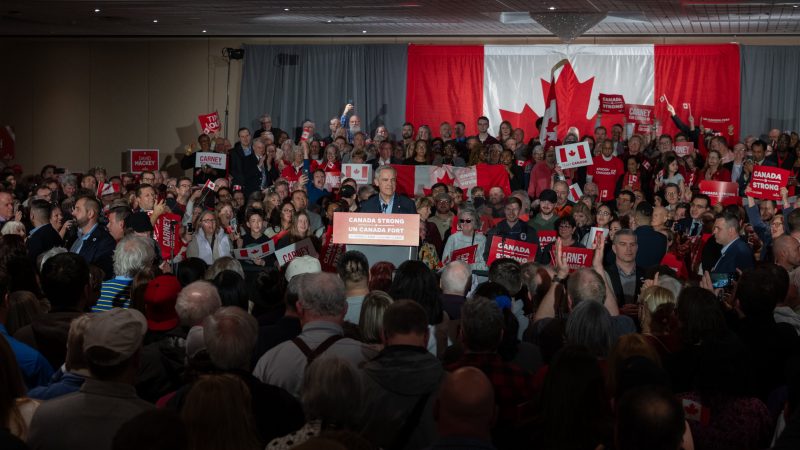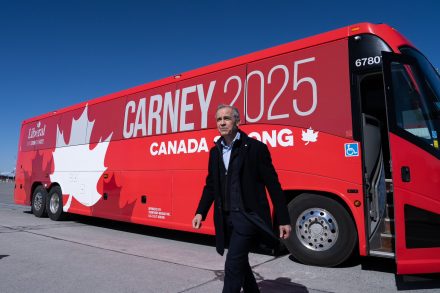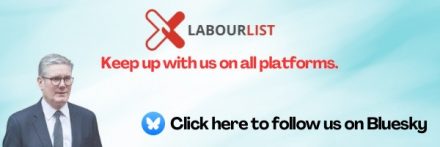
The first time I noticed “it” was on a Friday night, trying to tune out the stressful news that U.S. President Donald Trump was taking aim at my country – Canada.
First, through threats of a tariff war. Second, by “joking” about making Canada the 51st state of America and calling our prime minister “governor” of the 51st state.
Whether fact or fiction, Canadians are renowned for politeness. Trump’s taunting unleashed a nationalistic pride that feels uncharacteristically defiant.
So that Friday night watching TV, “it” hit me.
Team Canada queued up in the opening game of “The 4 Nations Faceoff”, involving hockey teams from Finland, Sweden, Canada, and America.
During the U.S. anthem, Canadians booed—loudly drowning it out. During the Canadian anthem, the audience sang as though their life depended on it. With pride, defiance, harmony.
Even Prime Minister Justin Trudeau, who was in that Montreal audience, was captured on video singing with his compatriots.
Then the gloves came off
An American player literally dropped his gloves and started a fight with Canadians… before the puck even dropped.
That was Act One of Canada’s new story. It’s a story of nationalist pride that surprised Canadians, laid bare hard truths about our friendship with America, and turned a disadvantage for Canada’s ruling Liberal government into a sudden advantage.
Until that moment, Liberal popularity had been tanking to levels that seemed beyond repair. The Conservative party, which had embraced Make America Great Again, or MAGA, style politics, seemed to be poised to take power.
That party had skillfully played off the politics of division, with slogans like “Canada is broken”. They had embraced the post-pandemic Freedom Convoy movement that turned Canada’s flag upside down and bombarded us with “F*ck Trudeau” messages.
As his personal and party popularity plummeted, Trudeau’s own caucus revolted, forcing a pre-election resignation. It proved to be a turning point.
READ MORE: Spring Statement: ‘Government should break the disability-poverty link, not entrench it’
Canadians are nice, but not that nice

Enter Mark Carney, former Bank of England governor during the Brexit crisis and former Bank of Canada governor during the 2008-09 global economic crisis.
Carney had earned a reputation of being a steady hand at the wheel but had never held political office. Nevertheless, after throwing his hat in the Liberal party leadership ring, he was quickly elevated to Canada’s new prime minister. This all got swept up with the country’s hour of heightened nationalistic pride.
Mark Carney is now at the start of a federal election, playing the role of Captain Canada.
Elbows up
Cherished Canadian actor and comedian Mike Myers stepped into the Trumpian fray by appearing on Saturday Night Live in a “Canada is not for sale” T-shirt, mouthing the words “elbows up” at the end of the show. For those uninitiated in the sport of hockey, players are taught at a young age to keep their elbows up as a defensive measure.
Few things evoke “Canadian” more than hockey, and since then, elbows up has become a rallying cry. Myers followed up with an election campaign opener video, appearing with the new prime minister, reinforcing the elbows up theme while wearing a hockey jersey with the words “Never 51.”
Elbows up, Canada. pic.twitter.com/0gJ2opnPjZ
— Mark Carney (@MarkJCarney) March 22, 2025
You may be wondering: how could the UK Labour Party capture a similar wave, bursting the alt-right populism bubble?
Policy matters. But in communications, there’s a saying: the best storyteller wins. Today, the Liberal Party is enjoying a storytelling resurgence.
There’s another saying: campaigns matter. Anything can happen. Especially when you’re running an election campaign in the middle of Trumpian chaos.
Is the secret for a political party to embrace nationalistic pride? That’s not only complicated, it’s fraught.
Nationalism can exclude a lot of people
Nationalism can obscure past wrongs, like the ongoing impact of colonialism on Canada’s Indigenous Peoples. It can ignore the imperfections that need to be addressed, like a lack of inclusiveness.
It can encourage people to look the other way, for the sake of unity while under threat, as neoliberalism stealthily tightens its grip.
Focusing on the public good remains dangerous to the neoliberal order. And neoliberalism remains alive and kicking. In the first week of Canada’s federal election, both the Liberal and Conservative parties rolled out a quintessentially neoliberal plan: a promise to reduce personal income taxes while insisting their goal is balanced budgets.
Those two aims do not square. So, in the neoliberal playbook, cuts to public services and social supports ensue.
We’re too early into Canada’s federal election to know how the nationalistic populist wave will end. There’s talk of strategic voting, hurting the New Democrats, traditionally the voice of workers.
READ MORE: ‘Ill thought out’ or ‘strong performance’? Reeves’ Spring Statement divides MPs
Then there’s the importance of getting out the vote
When you’re vying for the attention of the masses, trying to initiate change, you also need an effective ground game to get voters to the polls —a video just won’t cut it.
In the U.S., Democratic stalwarts Bernie Sanders and Alexandria Ocasio-Cortez are turning heads by focusing on their next ground war. They’re filling stadiums of 20,000+ people when they barely expected 3,000. They’re encouraging transformative change, not tax cuts and not mere slogans.
Unfortunately, that’s not the conversation we’re having in Canada today.
As the British know from the Brexit experience, national insecurity can undermine progressive outcomes for those seeking better working conditions, reduced income inequality, climate change initiatives, and the transformation of a neoliberal system that’s rigged in favour of the rich.
In Canada, we’re in elbows up defensive mode. Whether this succeeds in smashing the status quo or simply propping it up, it’s still too soon to tell.
For more from LabourList, subscribe to our daily newsletter roundup of all things Labour – and follow us on Bluesky, WhatsApp, Threads, X or Facebook .
- SHARE: If you have anything to share that we should be looking into or publishing about this story – or any other topic involving Labour– contact us (strictly anonymously if you wish) at [email protected].
- SUBSCRIBE: Sign up to LabourList’s morning email here for the best briefing on everything Labour, every weekday morning.
- DONATE: If you value our work, please chip in a few pounds a week and become one of our supporters, helping sustain and expand our coverage.
- PARTNER: If you or your organisation might be interested in partnering with us on sponsored events or projects, email [email protected].
- ADVERTISE: If your organisation would like to advertise or run sponsored pieces on LabourList‘s daily newsletter or website, contact our exclusive ad partners Total Politics at [email protected].





More from LabourList
‘I spent years telling workers the law couldn’t help them – that has changed’
Josh Simons resigns as Cabinet Office minister amid investigation
‘After years of cuts, Labour’s local government settlement begins to put things right’